Spanning hundreds of years, the Roman Empire is considered one of the greatest civilizations in the history of the world. An incredibly influential nation, its culture, history, battles strategies, and prominent leaders are all studied closely to this day. Any history lover knows the general history behind the rise and fall of this great empire, but we’ve compiled a list of books that delve deeper into Roman history than you may have ever gone before.
Explore new perspectives, important figures you may not have heard of, and gain a greater depth of understanding of the war strategies and battle armor of the ancient society that greatly shaped the modern world.
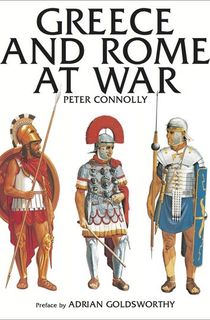
Greece and Rome at War
Covering the epic wars between the Greeks and Persians, and the Romans and Hannibal, this comprehensive guide makes use of contemporary evidence to offer an elaborate dive into the realities of Greek and Roman warfare from 800 BCE to 450 CE. Contained in this expansive volume are a dozen centuries’ worth of ancient weapons, armor, tactics, and military development, beautifully illustrated by Peter Connolly to bring the past to life. In-depth explanations accompany maps, diagrams and photographs that deliver a truly rich and accurate representation of the face of battle in the ancient world.
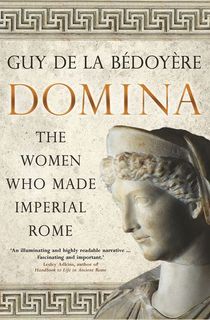
Domina
We’ve all heard the saying “behind every great man is a great woman”, but how much do you know of these women? Revisit the history of Rome with an illuminating new perspective as De la Bédoyère asserts that women were the true backbone of the powerful dynasty. Guided by a well-balanced account of gender interplay, move beyond tradition to focus entirely on these women’s role in contributing to the longevity of Rome. From Cleopatra to Livia to Octavia, follow the historic accounts which bring the ruthlessness and ambition of the women of the Roman Empire to the forefront.
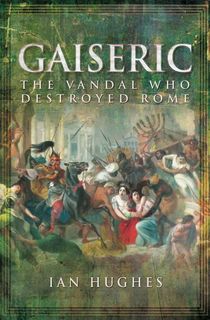
Gaiseric
Hailed as a barbarian who contributed significantly to the decline of the Western Roman Empire, Gaiseric was a highly skilled general and a dominant force in the Mediterranean for over 50 years. Despite being “synonymous with mindless destruction”, Hughes firmly advocates Gaiseric as a great king and leader in his own right. Military and political leader of his war tribe, the Vandals, Gaiseric carved a path across the Roman Empire to Spain and conquered North Africa, Rome’s vital source of grain. Roman attempts at battle were defeated, and the Vandals went on to invade, pillage, and conquer more Roman provinces under his rule.

Alaric the Goth
Roman history offers us another controversial figure in the form of Alaric the Goth. Banished to the fringes of Roman society, he lived amongst the violent ‘barbarians’ who were declared responsible for the destruction of ‘civilization.’ At least, that’s one controversial perspective on the Goths. Amidst Rome’s growing bigotry and intolerance, Boin reveals the Goths to be practicing Christianity and tolerance. He unfolds the true fascinating and elaborate role the Goths played in shaping today’s society through engaging storytelling and objective historical analysis. Through riots in the Capital, Alaric struck fear into the hearts of the powerful, and allowed the values of the Goths to pervade the world we know today.
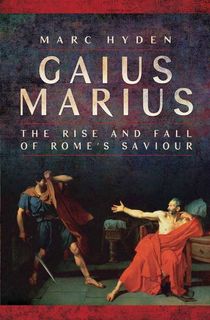
Gaius Marius
From savior of Rome to wretched fugitive, this historical account takes expert and amateur historians alike on the adventure that was the life of Roman General and Statesman, Gaius Marius. Gaining political success from his military service in Spain, North America and Italy, Hyden details Marius’ rise from poverty to the height of office in a pleasantly comprehensive narrative. Endure his betrayals and his narrow escapes from death as he purged Rome of its enemies to become one of the most impressive figures of Rome at the time.

The Annals of Imperial Rome
Tacitus’s final and greatest work provides a key source for modern understanding of the history of the Roman Empire. Spanning CE 14, the period just before Augustus’ death to CE 68, Nero’s death, the Annals carry conviction both as a work of art and as history.
Unfortunately, Tacitus’s passages did not all survive, but those that did contain a vicious biography of Tiberius, and more straightforward accounts of Gaius, Claudius and Nero. Grant’s authentic translation captures the emotional patriotism of Tacitus's moral tone, and conveys with vigor the lives of the great emperors who laid the foundations of modern Europe.
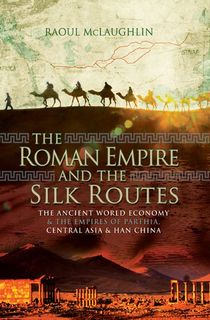
The Roman Empire and the Silk Routes
Explore the trade routes between Rome and the powerful empires of inner Asia. Delve into Rome’s trade ventures through the Tarim territories. Investigate Rome’s impact on the ancient world’s economy as the Han carried eastern products as far as Persia.
The first book to address these subjects in a single comprehensive study, McLaughlin weaves an intricate web of the trade routes connecting ancient Rome to Eastern civilizations’ fascinating history.

Cicero
Friend of Brutus, enemy of Caesar, patriot and idealist, Cicero emerges from the pages as the intensely boastful and astute defender of freedom that he was. Through a collection of unguarded letters to his friend Atticus, and of course, his legendary speeches, Anthony Everitt allows us access into the life of Rome’s most feared politician. Also one of the greatest lawyers of all time, Cicero is brought to life through Everitt’s engaging and dynamic accounts of Cicero’s role in the scandal-ridden, war-prone world of ancient Rome.
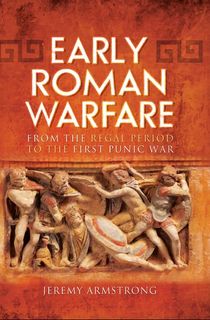
Early Roman Warfare
Rome produced one of the most sophisticated and formidable military forces, but it wasn’t always the distinguished war machine we know today. Join Dr. Armstrong as he retraces the Roman army’s development from its earliest discernible origins to its final legendary form. With a focus on the army’s equipment, organization, and overall strategic and tactical adaptability, this book is a must-read for anyone looking to explore the evolution which led to the Roman legions that dominated the entire Mediterranean world.

Pax Romana
The Roman Peace, or Pax Romana, wasn’t actually a period of peace. It was a period of imperial dominance, enslavement and ruthless rebellion. Romans controlled a large portion of the world and Goldsworthy aims in this historical account to explore how they managed such a feat. Embark on conquests, recount tyrannical reigns and examine the failed resistance movements of the conquered in this engrossing narrative of war and peace.
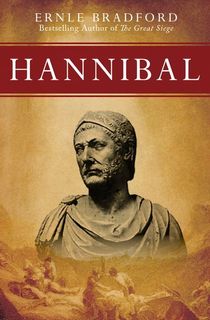
Hannibal
Considered one of the greatest military commanders of all time, Hannibal, inspired by his father, dedicated his life to Rome’s defeat. He famously led armies into the most brutal and costly battles in recorded history. Bradford’s richly detailed biography paints a vivid picture of ancient Carthage’s great leader whose strategies have been studied and copied by commanders throughout history, from his own Roman enemies to Napoleon Bonaparte.
This post is sponsored by Open Road Media. Thank you for supporting our partners, who make it possible for The Archive to continue publishing the history stories you love.



